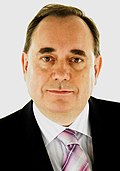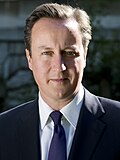Contesting parties
Since 2005, the Scottish National Party had come first in the 2007 Scottish Parliament election as well as the 2009 European election. They had also won the Glasgow East by-election in 2008, which was one of the safest Labour seats in the UK. This boosted the party's confidence and the party's leader Alex Salmond set the ambitious target of 20 seats in the general election. Salmond himself was standing down as an MP because he wanted to focus more on his job as First Minister of Scotland. In the election, the party only increased their share of the vote by 2.3% and had their number of seats reduced to six after being overwhelmingly defeated in the Glasgow East constituency.
The Scottish Labour Party had held the majority of seats in Scotland in every general election since 1959, and many prominent government officials were representing Scottish constituencies, such as the Prime Minister Gordon Brown and the Chancellor Alistair Darling. In the election, the Labour Party in Scotland increased its share of the vote by 2.5% and regained the Glasgow East and Dunfermline and West Fife constituencies after having lost them in by-elections over the course of the preceding term, giving them 41 out of 59 seats in Scotland.
The Scottish Conservative Party had not held the majority of Scottish seats in a general election since 1955 and it lost all eleven of its seats in the election of 1997. Since 2001, the party had only held one Westminster seat in Scotland. In 2005, following the re-organisation of Scottish constituencies, that seat was Dumfriesshire, Clydesdale and Tweeddale, a mostly rural constituency near the Scottish borders. However, the party had 11 target seats within Scotland for the election and party officials such as William Hague had predicted a 'Tory breakthrough' for Scotland. [2] Following the election, the Conservative vote in Scotland increased by roughly 1% but with only the 1 seat being retained.
During the 2005 election, the Scottish Liberal Democrats achieved 11 Scottish seats in Westminster and saw this figure increased to 12 following the Dunfermline and West Fife by-election in 2006. Two former Liberal Democrat leaders, Charles Kennedy and Menzies Campbell represent Scottish constituencies. In the election, the Liberal Democrat vote fell in Scotland and the party was once again left with 11 seats.
Minor parties such as the UK Independence Party, the British National Party and the Scottish Green Party all contested more Scottish seats than they did in the 2005 election. The Socialist Workers Party and Solidarity (a splinter group of the Scottish Socialists) took part in the Trade Unionist and Socialist Coalition for the election. The Scottish Socialist Party had contested all of the Scottish constituencies in 2005 but because of party splits, it fielded only 10 candidates for the 2010 election.
This page is based on this
Wikipedia article Text is available under the
CC BY-SA 4.0 license; additional terms may apply.
Images, videos and audio are available under their respective licenses.





